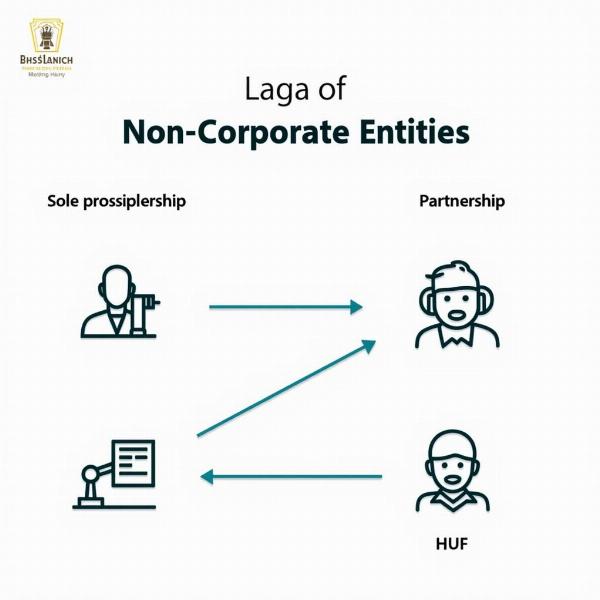Understanding the term “non-corporate” within the Indian context is crucial for anyone navigating the diverse business landscape of the country. “Non-corporate meaning in hindi” refers to entities that are not structured or operated as corporations. This encompasses a wide range of businesses, from small family-run shops to partnerships and sole proprietorships. Knowing the nuances of this term can impact your understanding of legal, financial, and social dynamics within India.
Decoding “Non-Corporate” in the Indian Context
The Hindi equivalent of “non-corporate” isn’t a single word but rather a descriptive phrase. Depending on the specific entity being referred to, you might use terms like “गैर-निगमित” (gair-nigamit), which translates directly to “non-incorporated,” or more specific terms like “व्यक्तिगत व्यवसाय” (vyaktigat vyavsay) for “individual business,” “साझेदारी फर्म” (saajhedaari farm) for “partnership firm,” or “एकल स्वामित्व” (ekal swamitva) for “sole proprietorship.” “Non-corporate meaning in hindi” truly encapsulates the essence of businesses operating outside the traditional corporate structure.
What does this mean in practical terms? It means these businesses aren’t governed by the same stringent regulations as corporations, offering them flexibility and simpler administrative processes. However, they also face different challenges, like limited access to capital and potential personal liability for business debts.
Types of Non-Corporate Entities in India
- Sole Proprietorship: This is the simplest form, where a single individual owns and operates the business. It’s easy to set up, but the owner is personally liable for all business debts. In Hindi, it’s known as “एकल स्वामित्व” (ekal swamitva).
- Partnership Firm: Two or more individuals agree to share the profits and losses of a business. A partnership agreement outlines the terms of this collaboration. The Hindi term is “साझेदारी फर्म” (saajhedaari farm).
- Hindu Undivided Family (HUF): A unique business structure in India based on a joint family, where the business is managed by a designated Karta. It’s called “हिंदू अविभाजित परिवार” (hindu avibhajit parivar) in Hindi.
 Legal structures of non-corporate entities in India
Legal structures of non-corporate entities in India
Advantages and Disadvantages of Non-Corporate Structures
Advantages:
- Ease of Setup: Registering a non-corporate business is generally less complex than incorporating a company.
- Flexibility: Less stringent regulations allow for quicker decision-making and adaptability.
- Lower Taxes: Depending on the structure and income, non-corporate entities may benefit from lower tax rates.
Disadvantages:
- Limited Liability: In most cases, the owners are personally liable for business debts.
- Raising Capital: Accessing funding can be more challenging compared to corporations.
- Limited Growth Potential: The lack of a formal structure can hinder scalability and expansion.
Why is Understanding “Non-Corporate” Important?
Whether you’re an entrepreneur, investor, or simply interacting with businesses in India, understanding the implications of “non-corporate meaning in hindi” is essential. It informs your interactions and helps you navigate the complexities of the Indian business landscape. From legal considerations to financial planning, recognizing the difference between corporate and non-corporate entities is a crucial element of conducting business in India.
Navigating the Non-Corporate Landscape
“Understanding the nuances of non-corporate businesses is essential for anyone operating within the Indian market,” says Dr. Anika Sharma, Professor of Economics at Delhi University. “It provides valuable insights into the country’s economic fabric and the driving forces behind its entrepreneurial spirit.”
Conclusion
“Non-corporate meaning in hindi” highlights the significance of businesses operating outside the formal corporate framework in India. Understanding the various forms of non-corporate entities, their advantages, and limitations is vital for navigating the dynamic Indian business environment. This knowledge can equip you with the tools needed to make informed decisions and build successful business relationships.
FAQs
- What is the exact Hindi translation of “non-corporate”? There isn’t one single word, but phrases like “गैर-निगमित” (gair-nigamit) are used depending on the context.
- Is it easier to set up a non-corporate business in India? Generally, yes, the registration process is less complex.
- Are non-corporate businesses taxed differently? Yes, the tax structure can vary depending on the specific entity and income level.
- What are the risks of running a non-corporate business? Owners often face personal liability for business debts and may find it harder to raise capital.
- What is the difference between a sole proprietorship and a partnership firm? A sole proprietorship is owned and run by one person, while a partnership involves two or more individuals.
- What is an HUF? It stands for Hindu Undivided Family, a unique business structure based on a joint family.
- Why is it important to understand the concept of “non-corporate”? It helps in understanding the Indian business landscape, legal frameworks, and financial implications of dealing with such entities.
Meaning-Hindi.in is your trusted partner for professional translation services, specializing in various domains, including business, legal, technical, website localization, educational, and urgent translations. Our expertise in translating between Hindi and other languages ensures accuracy, cultural sensitivity, and timely delivery. Need help with your translation project? Contact us at [email protected] or call us at +91 11-4502-7584. Meaning-Hindi.in is committed to bridging language barriers and facilitating seamless communication.